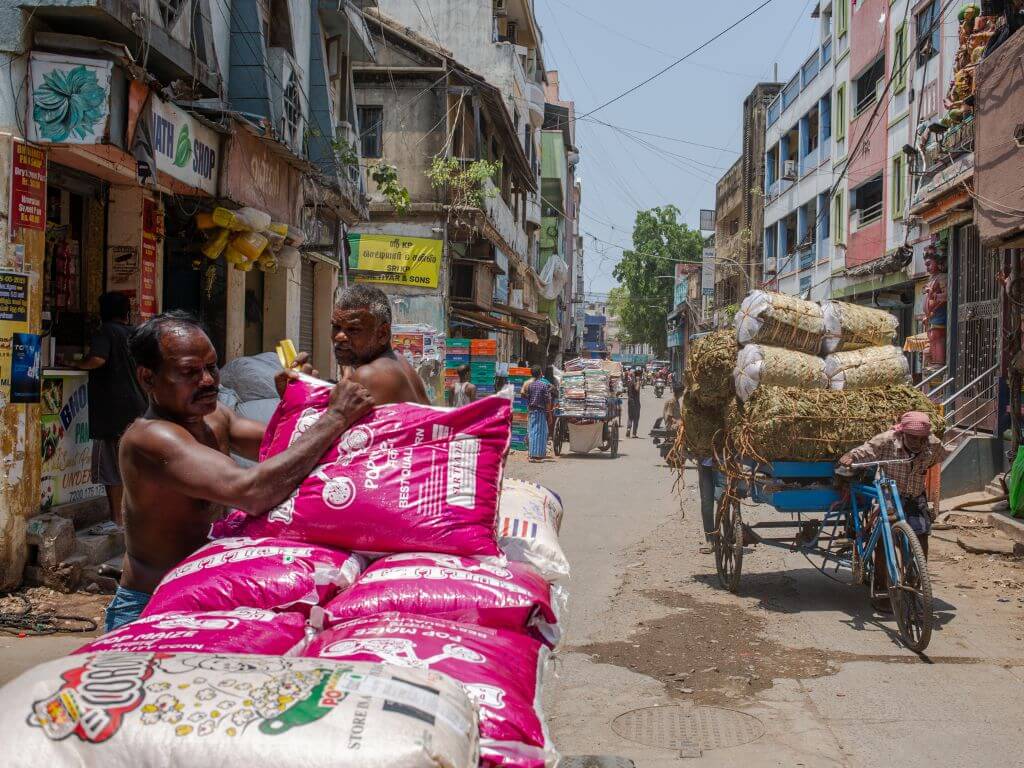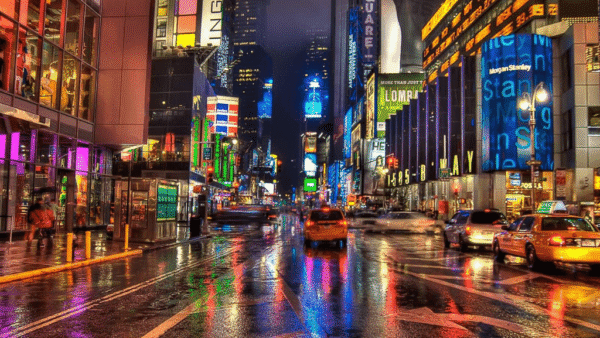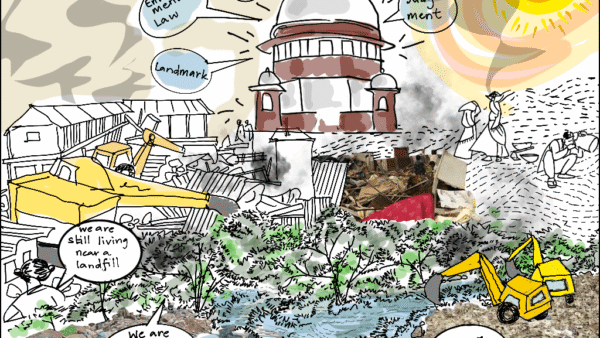On Acharappan Street in Parry’s Corner, Chennai’s old wholesale bazaar, Muthu and Krishnamoorthy are loading handcarts with sacks of rice and flour. This is hard physical labour on any day; it is utterly draining when the sun is blazing overhead and daytime temperatures are in the range of 40 degrees Celsius. But the two men, who have carried heavy sacks and loaded carts all morning this day in mid-May, do not have a choice. They must do this work for hours to keep their home fires burning.
This year, the heat in April-May has been particularly difficult for outdoor workers like Muthu and Krishnamoorthy – and me. I travelled the length and breadth of Tamil Nadu and spent summer days in Chennai documenting the lives and work of people who do not usually find space in the mainstream media. I am used to the heat, or so I thought. But after I trudged the streets in Parry’s Corner speaking to the head loaders for the better part of the day and taking their photographs, I found it difficult to get up the next morning.
All outdoor workers have it hard, a few harder. Loaders or men who carry headloads or cartloads, without whom the wholesale commercial hub of Parry’s Corner would not function, are among them. Each street here specialises in selling or trading certain products, the 20-25 streets are the city’s prized shopping destination – stationery and books on Bunder Street, flowers and garlands on Badrian Street, textiles and garments on Godown Street, household appliances and cutlery on Evening Bazar Road, dry fruits on Naicken Street, motors-pumps-pipes and insulation or packing materials on Mooker Nalla Muthu Street, hardware and sanitary ware on Thambu Chetty Street and so on.
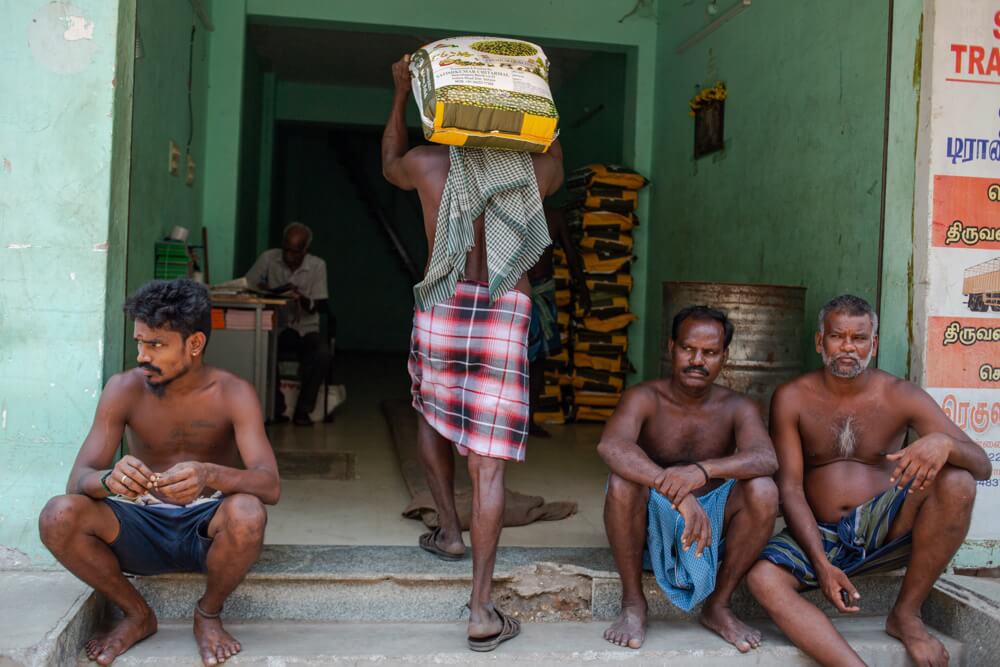
The frenzied retail commerce on each street is silently facilitated by thousands of men like Muthu and Krishnamoorthy. Hailing from Villupuram, the 48-year-old Muthu who has been at this work for 25 years, says, “Compared to last year, the heat is unbearable, especially from 11am to about 3pm. If we don’t work, we won’t get our daily wages. We are annadangachis, daily wage workers, who have to work when called for. Those who work in air-conditioned rooms don’t feel the heat. We also don’t feel the heat because we’re used to it,” says Muthu.
On good days, which are rare, he earns Rs 1,000 but his average take-home is between Rs 100 and Rs 500 a day. “Only if I tire myself out here every day, can I educate my children.” When his health fails, he returns home for two-three days, then comes back to Parry’s Corner. The busy time around here is the first half of the month, in the run-up to festivals, and in summer when shopping peaks.
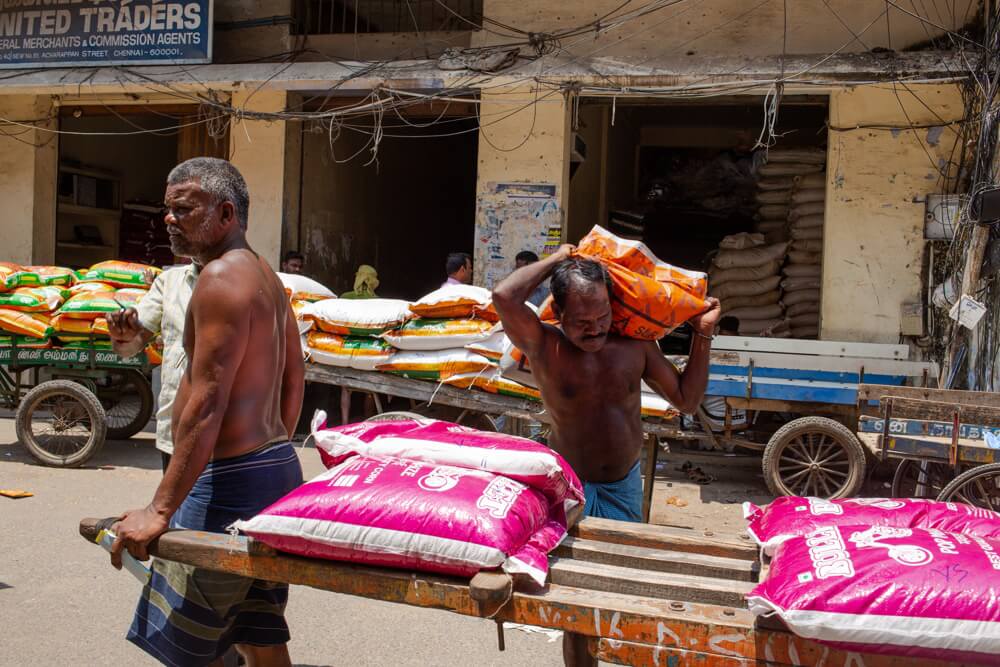
Krishnamoorthy, also from Villupuram, has been around Parry’s Corner for nearly 35 years. “If we are bothered by veyil (summer heat), we can’t live. We aren’t Tata- Birla’s grandchildren to chill at home with air conditioners. If we stay at home, we can only afford one meal. So we work…These heat waves literally burn our legs as we carry and drag goods that are meant to be carried by bulls and oxen. Each sippam, a bundle, weighs around 50 kilograms. We load 30-35 bundles and drag it using an iron hook with our bare hands. For one stretch, we drag around 1,500 kilograms,” he says. The footfalls in the bazaar have fallen as retail shopping only picks up in the evening but head loaders work through the day, ferrying goods from wholesale stores to the lorries nearby.
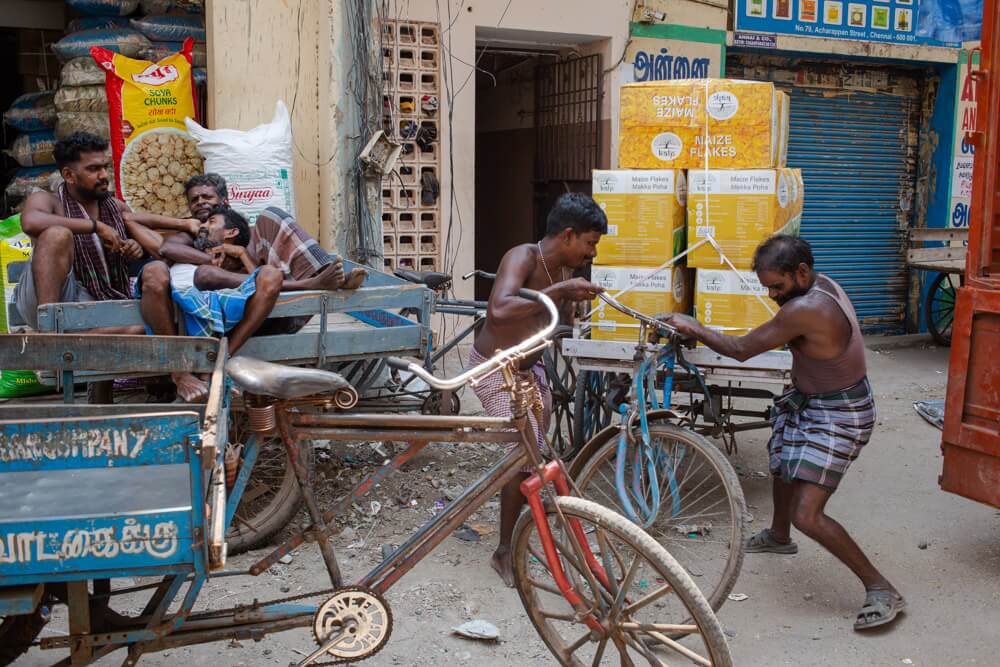
No water, no slippers
Most men hope to make between Rs 12,000 and Rs 15,000 a month but there are no guarantees. As the 29-year-old R. Raji, from Vyasarpadi in Kannayapuram, says, “We earn according to the work we do every day. Some days we walk home with empty pockets; on other days, we get paid.” They save a large chunk from their meagre earnings for their families, usually for children’s education, which they take with them when they return to their villages in the second half of the month.
However, they do not stay home for more than two-three days because “a prolonged holiday makes us unwilling to return to this work…We are expected to carry and drag loads like bulls do. The only difference between bulls and us is that we are born humans,” lament Muthu and Krishnamoorthy.
Many head loaders are forced to count their paise even to keep themselves hydrated. Coconut water, usually recommended to beat the heat, costs Rs 50 apiece which is expensive for them. They make do with water available in the bazaar, mostly due to largesse of their owners or shopkeepers. Says G Ramesh, from Thindivanam who has carried head loads for 25 years, “From the Rs 500-600 I earn every day, I keep a hundred for my food and send the rest home. How much water can I buy?”
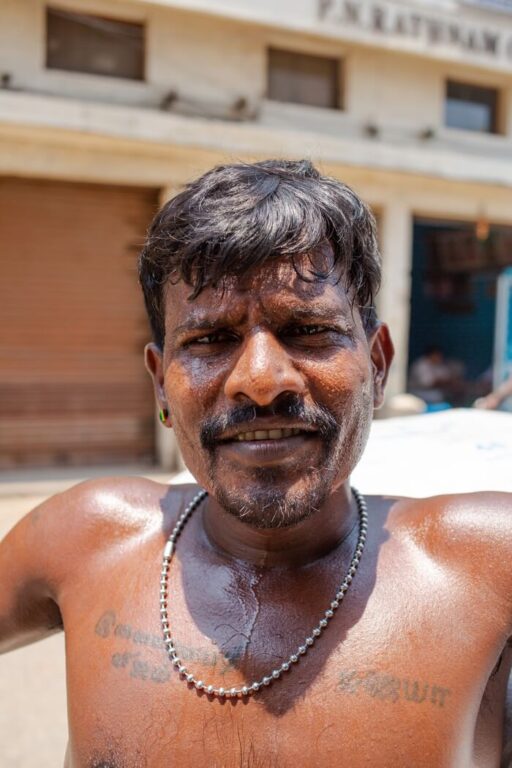
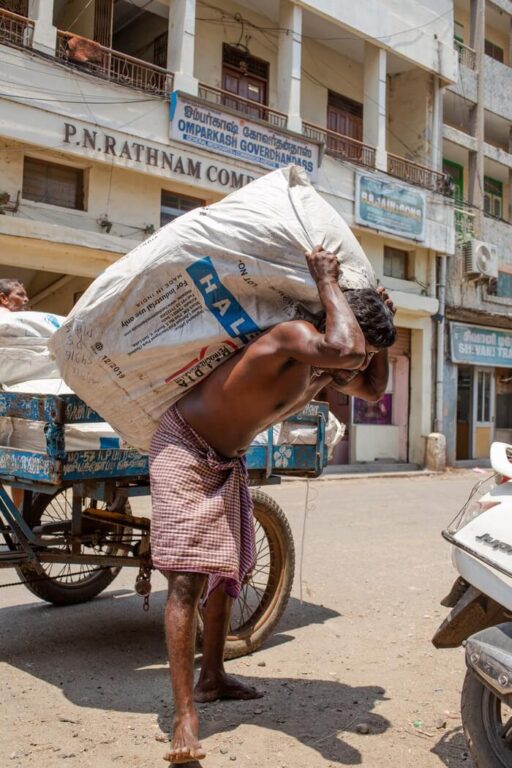
Ramesh believes that this summer has brought unbearably high heat compared to the past. “This summer heat is cooking our bodies alive. The heat begins to rise around 7am and it is extremely hot till past 3pm. It is exhausting. If we pull a load, we can’t get to the next one without relaxing for a few minutes. When we put our feet down, we can see sweat running off our feet. I suffer from severe body pain as well as physical fatigue. But I work,” he explains, drenched in sweat.
Ramesh, like many head loaders here, does not use footwear. They can, at best, afford chappals or slippers but these are hazardous. They find that chappals make them slip. Says Muthu, “It’s extremely dangerous to wear slippers while pulling and dragging huge bundles. Many have met with accidents, a few have even died in such accidents. Our feet get scorched and blistered which causes awful pain, our legs burn and itch. At night, this burning sensation spreads across our entire body, hits our heads. If we lie down, we can’t get up. If there are any casualties, the owners don’t help us. We work here as long as we can; when we can’t, we have to simply leave.”
Their nights are hardly better than their days. Without their own houses or rooms to return to, they make do with sleeping slots in shops or lorry sheds. The bazaar is where they work – and rest.
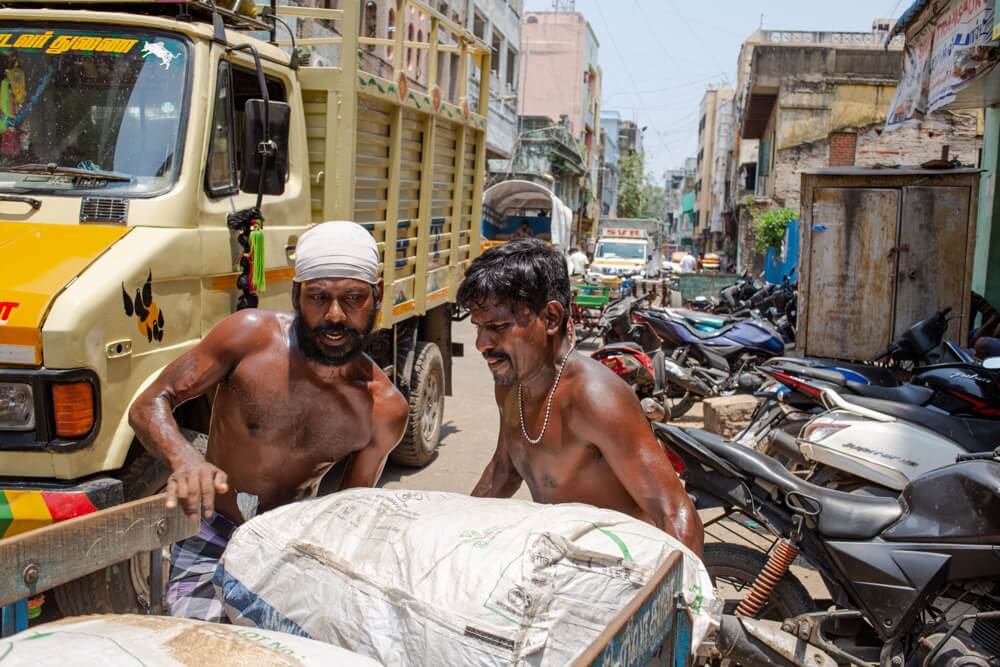
Scarce public facilities
The loaders and cart pullers complain of heat-related skin problems and diseases. M. Parthiban, 32, has skin eruptions but he cannot afford medical attention. “The cost of living has peaked after GST was introduced but our wages remain the same. We are paid Rs 700 for a hundred bundles, but if there are five of us then we get Rs 100 each.”
The common complaint here is lack of facilities. Drinking water facilities and public toilets – two critical amenities for outdoor workers, especially in summer, mandated even in the city’s Heat Action Plan (HAP) – are scarce here. Most men rely on the goodness of shopkeepers, where they deliver their loads, to get the much-needed glass of water. A few get, others don’t. “If we have to relieve ourselves, we squat near dustbins. Even if we choke while eating, it’s hard to find a glass of water,” says Parthiban. The nearest common toilet is almost two kilometres away at the bus stand.
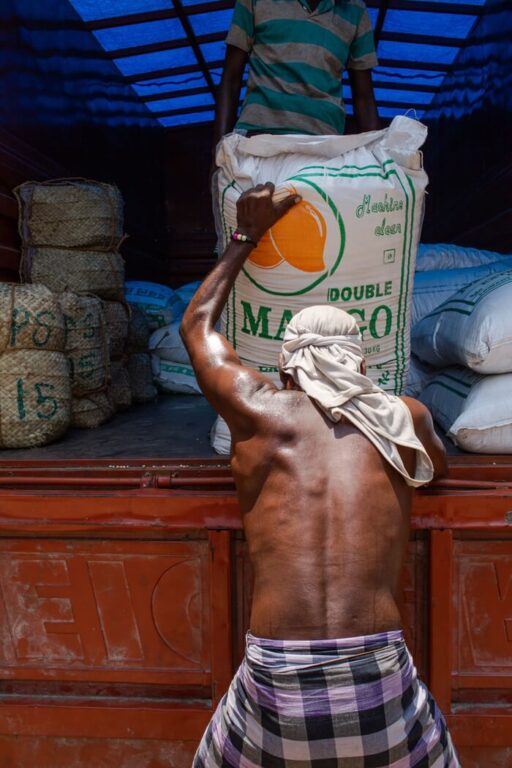
Thirty-eight-year-old S. Vetri from Vyasarpadi is among the newer men on the job. He finds the heat highly oppressive, but somehow gets through the day. “This work is very torturous but I don’t want to rely on anyone. My wife died a few years ago from cancer; we didn’t have kids.” Men from Ariyalur, Salem, Thindivanam, Pondicherry, Marakanam, Kadaloor, Vilupuram and Virudhachalam and many other places come here to work, most of them spending nights in an allotted part of their workplaces and starting work by sunrise to beat the heat. Yet, the heat makes them slower. As S. Krishnan, 30, says, “I would be done by 12 noon if I started pulling the loaded cart around 11am but now it gets done by 2pm. No matter how much water I drink, I feel dehydrated. I don’t use the bathroom till evening by when urine becomes concentrated dark yellow.”
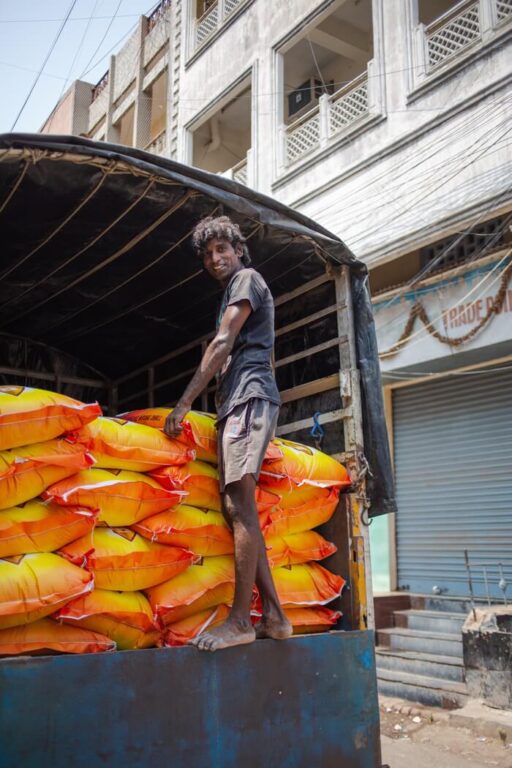
This is where public amenities like cool shelters, drinking water, and public toilets matter. It is the responsibility of governments or civic bodies to provide these, according to the HAP.
Islands of heat
Areas that are densely built and highly congested at most hours of the day tend to be hotter than others – the Urban Heat Island effect. Studies[1] showed that commercial hubs in north Chennai, where Parry’s Corner is located, are among the areas in the city where “the temperature differences between fringes and central parts of heat packets were in the range of 3 to 4.5 degrees Celsius”. This study [2] cited high discomfort in May and June.
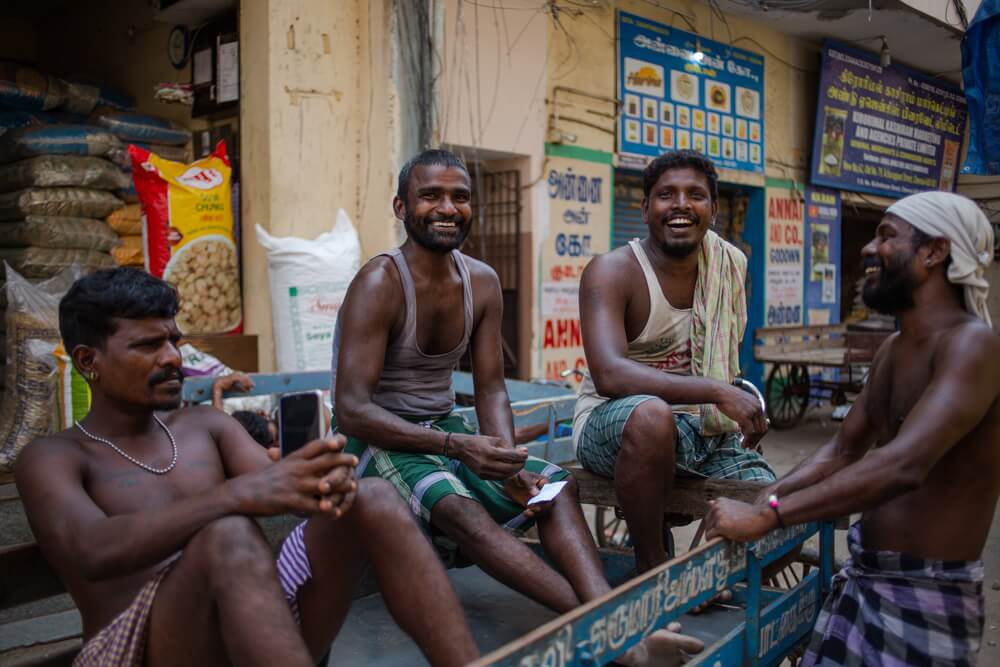
Chennai, a coastal city, sees high daytime temperatures which have been on the rise but the heat index – feels-like temperature – is higher due to the high humidity. So, 38 degrees Celsius can feel like 45 degrees Celsius to people and extended exposure to such levels can turn hazardous.
“We can’t afford even a tender coconut to beat the heat. We earn only Rs 7 or 8 per bundle so how can we spend that money on a tender coconut that costs ₹50. Our owners provide us with buttermilk and curd rice – that’s all we have. Only if someone buys for us can we drink and eat other things,” says Vetri.
This raises questions about the associations and sanghams that workers like Muthu, Krishnamoorthy and Vetri are part of, which can negotiate with traders or the government on their behalf.
It’s a sore point with many of the men. S. Shankar, 46 years old and working in Parry’s Corner for the past 25-30 years, says that around 2,000 men must be at work at any given time in these streets. “There are many sangams and associations here for us, but I don’t find them doing anything worthy for our welfare,” he shrugs. The Sumai Thookum Tholilalar Sangam office bearers did not respond to the phone calls.
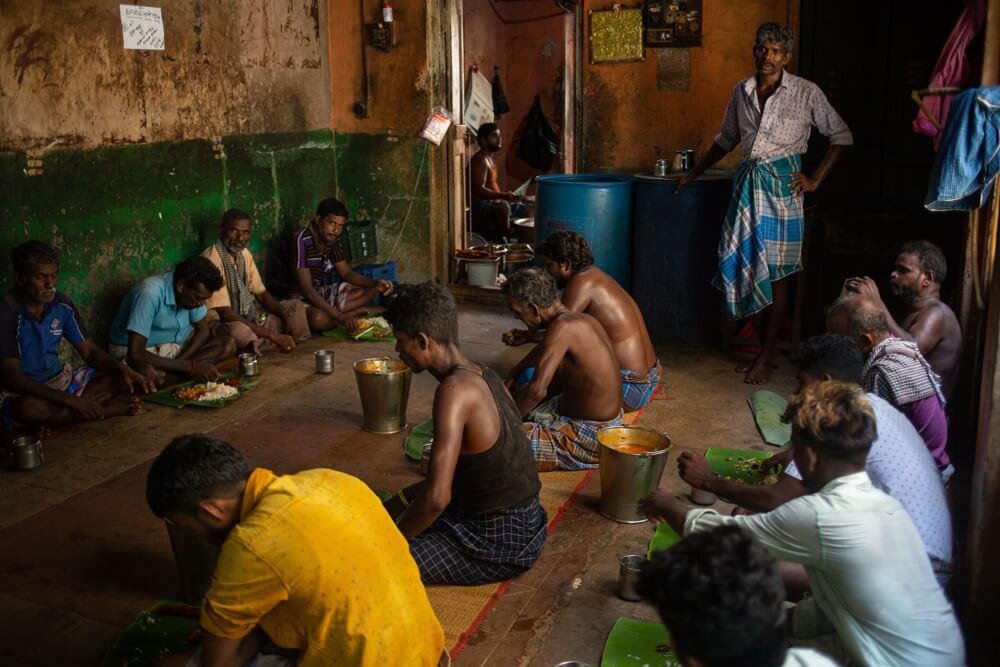
Even the provision of basic facilities of cool shelters and drinking water on each street can make a huge difference to the thousands of outdoor workers, especially those who do hard labour, in Parry’s Corner. It has office spaces, of course, but these are out of bounds for the head loaders. “The office spaces are used only by owners-traders, we annakavadigal belong to the streets. They are the entrepreneurs, we are after all only daily wage labourers,” bemoans Parthiban.
It is these men on the streets who most need respite from the harsh sun and high heat. “During summer, it’s a nightmare to pull carts. When we walk barefoot on tar roads, we literally feel our feet burning,” bemoans Krishnamoorthy.
M Palani Kumar is an award-winning photographer from Chennai. He was recognised as one of the ‘Top Ten Humans 2019’ by Anandha Vikatan, a popular Tamil magazine, for his attempt to sensitise and visibilise the work of manual scavengers. In March 2020, he received the ‘Best Story of the Year’ Award from the Public Relations Council of India. Kumar is currently documenting the lives of working-class women across India.

